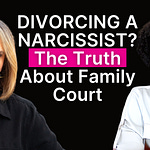When someone looks you in the eye and says, “You’re overreacting,” “You’re too sensitive,” or “This is all in your head,” your nervous system registers something long before your mind can catch up.
That something is what this conversation with Kimberly Weeks was all about.
Kimberly isn’t just a mentor in the field of trauma recovery. She’s walked through the fire herself. From her own childhood experience to surviving a narcissistic marriage, Kimberly brings a rare combination of clinical knowledge and lived truth. And when she talks about narcissistic abuse—not just as a theory, but as a deeply destabilizing experience—you feel the truth in your bones.
What Is Narcissistic Abuse?
There’s abuse, and then there’s narcissistic abuse.
As Kimberly Weeks explained, not all abuse is the same. Someone might cause harm because they’re overwhelmed, under-resourced, or repeating old patterns—but they often carry remorse and want to change.
Narcissistic abuse is different. It’s strategic. It’s calculated. And worst of all—it’s addictive.
Yes, addictive.
Because the cycle—love bombing, devaluation, discard, and hoovering—doesn’t just mess with your mind. It hijacks your biology. Cortisol, oxytocin, adrenaline—it all creates a chemical tether that keeps you locked into believing, “Maybe it was my fault. Maybe I can fix it.”
But here’s the truth: You didn’t cause this. And you can’t cure it.
It’s Not About the Label
Many clients ask, “Is he/she a narcissist?”
And while the question is valid, Kimberly and I both agree—the more important question is: How do you feel in this relationship?
Do you feel safe? Seen? Heard?
If the answer is no, the label becomes less important than the liberation.
Weaponized Confusion
One of the most chilling takeaways from our conversation was this phrase from Kimberly Weeks: weaponized cognitive dissonance.
It’s the back-and-forth of emotional whiplash. The confusion of “He was amazing yesterday—so why do I feel like I’m losing my mind today?”
That confusion is the abuse.
Kimberly described how abusers strategically create chaos, then call you unstable for reacting. They undermine your voice, distort your reality, and often—go one step further—by telling your friends, your family, even your therapist, that you are the problem.
It’s not just emotional abuse. It’s identity erosion.
The Most Dangerous Phase: After You Leave
If you think the abuse ends when you leave, think again.
Post-separation abuse is real—and often escalates when the narcissist loses control. That’s when the smear campaigns begin. When the legal system becomes a weapon. When even a birthday post can be twisted into a battleground.
Kimberly reminded us that the most powerful thing you can do in these moments is go no contact. It’s not punishment. It’s protection. It's recovery. It’s detox.
You Are Not Alone
If this episode left your nervous system buzzing, I want you to pause.
Breathe.
You are not crazy. You are not overreacting. And you are not alone.
Whether you’re in it, coming out of it, or still trying to make sense of what it even is, I hope you’ll hear this:
“The fact that you're even trying to understand what happened to you is proof they didn't break you.” – Kimberly Weeks
You are lovable. You are worthy. And you don’t have to figure this out alone.
Resources:
Kimberly Weeks | TheNarcissisticAbuseCoach.com
Let’s keep this conversation going.
If this resonated, reply to this post or forward it to someone who needs to know—they’re not the crazy one.














Share this post